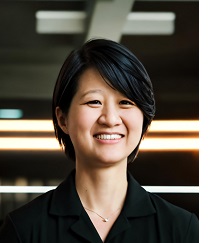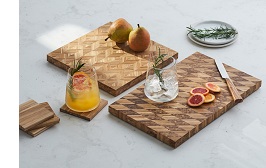
 As the driving force behind Renew by Trinity, Cze-Chao Tam is a
leader who blends innovation with sustainability, bringing those
practices to the forefront. Her path to leadership, however, was far
from linear. While studying at the Massachusetts Institute of
Technology, Tam seemed set for a career in finance. She even held a
finance job while in school but quickly realized that industry
wasn’t for her. “I hated it, not because of the work, but the
environment. It was so much about money,” she explains. “I can't
live my life just chasing money and trying to make more money than
the guy next to me."
As the driving force behind Renew by Trinity, Cze-Chao Tam is a
leader who blends innovation with sustainability, bringing those
practices to the forefront. Her path to leadership, however, was far
from linear. While studying at the Massachusetts Institute of
Technology, Tam seemed set for a career in finance. She even held a
finance job while in school but quickly realized that industry
wasn’t for her. “I hated it, not because of the work, but the
environment. It was so much about money,” she explains. “I can't
live my life just chasing money and trying to make more money than
the guy next to me."
Returning to California without a clear plan, she reconnected with a
small business she had worked at during high school, a transitional
period that soon opened unexpected doors. After offering financial
advice to an industry professional, Tam found herself fully immersed
in Trinity, where she began to reshape the company’s mission,
emphasizing sustainability and innovative storage solutions.
 Channeling her creative energy and business acumen,
Tam led the development of the Renew by Trinity line—a collection
crafted from reclaimed bamboo chopsticks that are both stylish and
practical. These products are made from what are essentially wood
tiles, created by compressing and resin-coating sterilized used
chopsticks collected from partner restaurants in Texas to minimize
transportation emissions.
Channeling her creative energy and business acumen,
Tam led the development of the Renew by Trinity line—a collection
crafted from reclaimed bamboo chopsticks that are both stylish and
practical. These products are made from what are essentially wood
tiles, created by compressing and resin-coating sterilized used
chopsticks collected from partner restaurants in Texas to minimize
transportation emissions.
Tam highlights the relatability of this material choice: “For us,
this was something that was a lot more relatable for a consumer.
Most people have used single-use chopsticks at some point in their
life versus they've never seen a rubber tree.”
Despite her many accomplishments, Tam has often been underestimated.
“When people first meet me, they don't really pay me any attention.
They figure that I'm unimportant, which is fine,” she explains.
“When they learn my position, they usually immediately ask me if
Trinity is a family business,” Tam continues, “because they assume
that as an Asian I inherited the business. This is true of whether I
meet Asian people or non-Asian people because in Asian culture, it's
very popular to have a family business passed down to your children.
I think also that as a female and a younger female they assumed that
I couldn't have built it.”
Yet, her background has also provided unique advantages,
particularly in navigating international partnerships. "In the
manufacturing industry, I was inevitably going to work with partners
in China,” she reflects. “I'm incredibly grateful that my parents
forced me to learn both Mandarin and Cantonese growing up. I hated
it at the time, but being able to speak the language I think has
definitely allowed us to form relationships in a much smoother and
deeper way."
Her bilingual skills and bicultural perspective allow her to
navigate cross-cultural differences with ease. “I think having the
dual perspective of being an Asian-American has also afforded me the
cultural sensitivities to approach our cross-cultural partnerships,”
she says. “Good or bad, I can understand why they do the things they
do or why they say the things they say whether I like it or not, at
least. If I weren't Asian-American, I would probably be very
offended or very angry or frustrated and trying to approach the
situation from my American-only side.” Her ability to bridge
cultural gaps has been a key asset in building successful
partnerships, particularly as she guides the company towards more
sustainability.
Looking ahead, Tam envisions a future where sustainable practices
become the industry standard, ensuring that all home products and
renovations contribute to a healthier planet. With her at the helm,
Renew by Trinity is setting a new standard in both quality and
environmental responsibility, reflecting Tam’s unwavering commitment
to meaningful, lasting change.
Images provided by Renewal by Trinity and Cze Chao Tam

